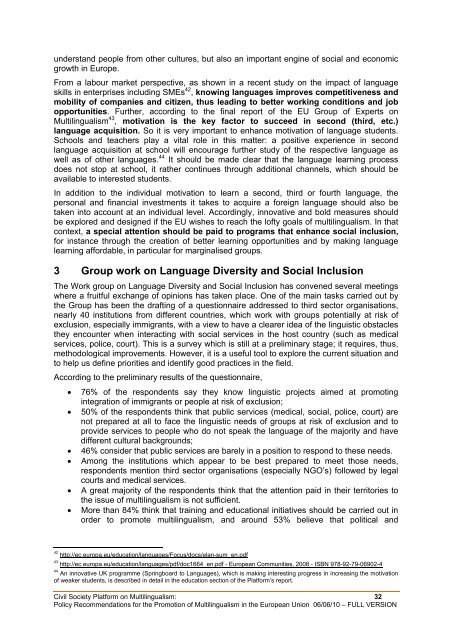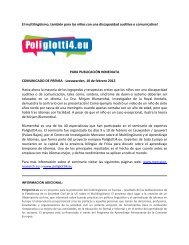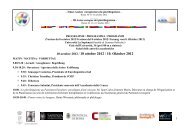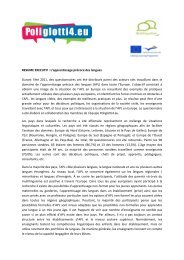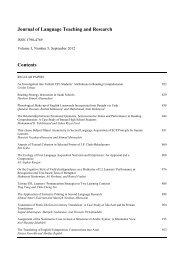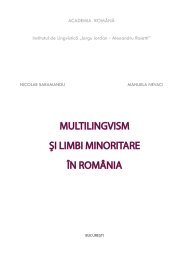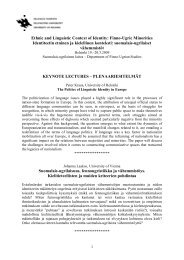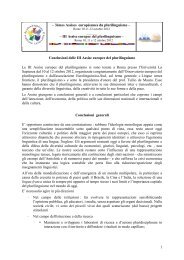understand people from other cultures, but also an important engine of social and economicgrowth in Europe.From a labour market perspective, as shown in a recent study on the impact of languageskills in enterprises including SMEs 42 , knowing languages improves competitiveness andmobility of companies and citizen, thus leading to better working conditions and jobopportunities. Further, according to the final report of the EU Group of Experts onMultilingualism 43 , motivation is the key factor to succeed in second (third, etc.)language acquisition. So it is very important to enhance motivation of language students.Schools and teachers play a vital role in this matter: a positive experience in secondlanguage acquisition at school will encourage further study of the respective language aswell as of other languages. 44 It should be made clear that the language learning processdoes not stop at school, it rather continues through additional channels, which should beavailable to interested students.In addition to the individual motivation to learn a second, third or fourth language, thepersonal and financial investments it takes to acquire a foreign language should also betaken into account at an individual level. Accordingly, innovative and bold measures shouldbe explored and designed if the EU wishes to reach the lofty goals of multilingualism. In thatcontext, a special attention should be paid to programs that enhance social inclusion,for instance through the creation of better learning opportunities and by making languagelearning affordable, in particular for marginalised groups.3 Group work on Language Diversity and Social InclusionThe Work group on Language Diversity and Social Inclusion has convened several meetingswhere a fruitful exchange of opinions has taken place. One of the main tasks carried out bythe Group has been the drafting of a questionnaire addressed to third sector organisations,nearly 40 institutions from different countries, which work with groups potentially at risk ofexclusion, especially immigrants, with a view to have a clearer idea of the linguistic obstaclesthey encounter when interacting with social services in the host country (such as medicalservices, police, court). This is a survey which is still at a preliminary stage; it requires, thus,methodological improvements. However, it is a useful tool to explore the current situation andto help us define priorities and identify good practices in the field.According to the preliminary results of the questionnaire, 76% of the respondents say they know linguistic projects aimed at promotingintegration of immigrants or people at risk of exclusion; 50% of the respondents think that public services (medical, social, police, court) arenot prepared at all to face the linguistic needs of groups at risk of exclusion and toprovide services to people who do not speak the language of the majority and havedifferent cultural backgrounds; 46% consider that public services are barely in a position to respond to these needs. Among the institutions which appear to be best prepared to meet those needs,respondents mention third sector organisations (especially NGO’s) followed by legalcourts and medical services. A great majority of the respondents think that the attention paid in their territories tothe issue of multilingualism is not sufficient. More than 84% think that training and educational initiatives should be carried out inorder to promote multilingualism, and around 53% believe that political and42http://ec.europa.eu/education/languages/Focus/docs/elan-sum_en.pdf43http://ec.europa.eu/education/languages/pdf/doc1664_en.pdf - <strong>European</strong> Communities, 2008 - ISBN 978-92-79-06902-444An innovative UK programme (Springboard to Languages), which is making interesting progress in increasing the motivationof weaker students, is described in detail in the education section of the Platform’s report.Civil Society Platform on Multilingualism: 32Policy Recommendations for the Promotion of Multilingualism in the <strong>European</strong> Union 06/06/10 – <strong>FULL</strong> <strong>VERSION</strong>
administrative actions should also be launched. Awareness raising and informationcampaigns are, according to them, important tools to enhance multilingualism. As to language learning, 73% believe that second language acquisition is useful,mainly for professional reasons (84%), followed by personal interest (61%). 42% study a second language because it is a compulsory subject at school. Among the obstacles to learning a second (or third) language, 57% think it is adifficult endeavor, 38% do not have the time to devote to that task and a smallergroup thinks that lack of personal interest is another contributing reason of difficulty.Additionally, the Work group has considered other studies, such as a survey carried out inrecent months in Spain 45 , which shows that 63% of Spaniards know no English at all, while amere 22,9 % of the population assess they are able to speak and write in this language(indeed the most popular foreign language in Spain), and only 8,3% say they have studied aforeign language. Curiously enough, over 90% of the population consider that commanding aforeign language is very important (50,3%) or important (40,8%). An interesting result fromthis survey is that 73,9% of the population say they have not felt negatively affected ordiscriminated against in their professional or academic life for their lack of other languages,but 25,5 (one out of four people!) say the opposite. We can imagine the results of this surveyif the questionnaire had been addressed to immigrants coming from countries that speak adifferent language from that of the host country. In this context, it is interesting to mention therecent debate in Germany about the difficulties experienced by the Minister of Foreign Affairswhen asked at a press conference to respond to an English journalist in English. His refusalto do so did probably affected negatively his image. We cannot probably think of a similarsituation in which a British politician would be negatively affected when refusing to respond inGerman to a German journalist in London! Mr. Barroso′s approach to speak, wheneverpossible, the language of the country he visits, is seen with a positive eye by the citizen ofthe respective country.There are a number of less-favored social groups for whom language learning is not be agoal in itself, but an instrument within a more far-reaching objective: social empowerment ofthese groups, assuring competences which allow full participation and integration in society.This means that language learning cannot be approached in isolation to other aspects ofempowerment, both on a material level and on the level of social competence. 46 Importanttarget groups within policies aiming at social inclusion/cohesion will be: Migrants; People with a communicative handicap (deaf, blind, dyslectic persons...); Elderly people 47 ; People affected by relations between major and minor languages 48 ; Citizen with low motivation due to their special economic or social situation, and/orlow schooling, especially(functionally) illiterate persons.These groups offer a number of peculiarities which constitute additional obstacles inapproaching and motivating them for (language) learning 49 . Furthermore, these indicative45The last barometer by the Spanish CIS (Centro de Investigaciones Sociológicas – Centre for Sociological Research-) ofSpain, presented in March 2010, with a sample of 2,500 people of over 18 years of age.46I.e. reading and writing, knowledge of the social and cultural environment etc.47The elderly population is right now one of the most vulnerable groups in Europe. It is increasing every day mainly due todemographic changes, high life expectancies, good health system and low birth rates. They have special needs beyondhandicap, illiteracy or migration with the need to be also to be included in a multilingual and multicultural society. Politics ingeneral shall consider this target group proposing a general review to be adapted to the big changes an old society means to beprepared for the future. Now we have the opportunity to include this group also in multilingualism policies in order to give thistarget group more opportunities making from them and active group within the society, rather than a passive group, as it isconsider right now by most of the population.48Official languages, historical languages and those of local communities due to flows of population.49Many members of the above mentioned groups might have a low or defective competence level even in their own language,i.e poor writing ability, and a negative school experience, and hence, will have low learning motivation.Civil Society Platform on Multilingualism: 33Policy Recommendations for the Promotion of Multilingualism in the <strong>European</strong> Union 06/06/10 – <strong>FULL</strong> <strong>VERSION</strong>


